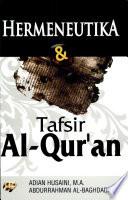“Metodologi neomodernisme tafsir Fazlur Rahman bisa dikatakan sebagai eksemplar tafsir al-Qur’an yang tetap sesuai dengan kebutuhan masyarakat kontemporer. Karena itu, metodologinya terus dikembangkan dan diapresiasi oleh gerenasi setelahnya, utamanya oleh Abdullah Saeed dengan tafsir kontekstualnya. Spirit tafsir ini kemudian menjalar ke buku yang ada di depan sidang pembaca ini. Selamat membaca pemikiran-pemikiran bernas dalam buku ini!” Dr. Aksin Wijaya, Direktur Pascasarjana IAIN Ponorogo. * * * Fragmentasi dan diferensiasi ilmu-ilmu keislaman, khususnya teologi dan hukum Islam, terus mengemuka hari ini. Dampaknya, hukum Islam mengalami krisis epistemologis dan paradigmatis. Hukum Islam dipahami secara normatif belaka, dijauhkan dari moralitas, dan tercerabut dari realitas kehidupan. Problem ini berbanding lurus dengan merunyaknya fenomena keberagamaan yang mengarah pada puritanisme dan radikalisme di Indonesia. Seyogianya, sangat dibutuhkan gerakan reorientasi paradigmatis penalaran hukum Islam dari teosentris dan antroposentris ke teoantroposentris. Paradigma ini dimaksudkan untuk mengintegrasikan wahyu dan akal, agama dan kehidupan, serta norma dan nomos. Kerangka paradigmatis inilah yang kelak mesti menjadi basis pengembangan dan rekayasa hukum Islam masa depan. Buku ini meneliti dengan saksama mengenai metode progresif-integratif teoantroposentris tersebut dengan menjadikan pemikiran Fazlur Rahman dan Abdullah Saeed sebagai model risetnya.
nya terhadap alQur'an menitikberatkan pada muatan ethico-legal alQur'an.142 Hazara, tempat kelahirannya, terkenal bagus dalam pendidikan keislaman. Ayahnya bernama Mawlana Shihab adDin, seorang ilmuwan hasil pendidikan Deoband Seminary, ...










